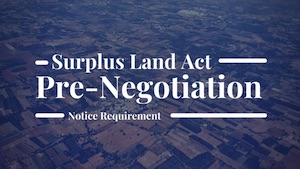
The revised Surplus Land Act contains negotiation requirements to encourage the sale of surplus public land. Also, the law makes it more likely that the land will ultimately be developed for as much housing as possible. Prior to entering negotiations, however, AB 1486 requires that the agency selling the surplus land must first give notice.
Government Code section 54222 states that “Any local agency disposing of surplus land shall send, prior to disposing of that property or participating in negotiations to dispose of that property with a prospective transferee, a written notice of availability to all of the following [list of persons]. (emphasis added.)”
By the use of the mandatory term shall, this section mandates notification and therefore ensures that the widest possible array of interested persons will be able to compete to develop the surplus land.
The persons or entities to whom notice is required to be given fall into five distinct categories.
First, subdivision (a) requires the selling entity to send notice to local public entities and “housing sponsors” who have indicated an interest in developing low-and-moderate income housing.
Generally, a “housing sponsor” is any individual, joint venture, partnership, cooperative, local public entity, corporation, an Indian reservation that is certified by the Department of Housing and Community Development to own, build, or rehabilitate a housing development, whether for-profit, nonprofit, or limited profit, and subject to the Department’s regulatory powers. It also includes “persons and families of low or moderate-income” approved to own and occupy a housing development. (see Health & Safety Code § 50074.)
Second, subdivision (b) requires the selling entity to notify any park and recreation department that may use the land for open space or park purposes.
Third, subdivision (c) requires the selling entity to notify any school district where the property is located if it is suitable for school facilities.
Fourth, subdivision (d) requires the selling entity to notify any governmental authority when the land is located within an infill opportunity zone, as designated in Section 65088.4, or an area covered by a transit village plan adopted under Government Code section 65460 et seq.
Fifth, subdivision (e) requires the selling entity to notify any entity authorized to buy surplus land who has notified the selling agency of its interest in buying or leasing the land within 60 days after the notice of availability.
Thus, after sending such notices, the local agency may begin negotiations with those persons who are interested in the property.
Notably, subdivision (f) clarifies that “participating in negotiations” does not include the commissioning of appraisals:
- Due diligence prior to disposition
- Discussions with brokers or real estate agents not representing a potential buyer
- Engaging in other studies to determine the value or best use of land
- Issuing a request for qualifications, developing marketing materials
- Discussing the property internally
Conclusion
If you are contemplating the purchase of surplus land and would like assistance navigating the process, please contact Underwood Law Firm, P.C., for an initial consultation.
Go here to get more details.
 California Partition Law Blog
California Partition Law Blog

